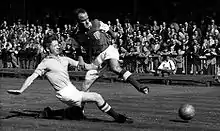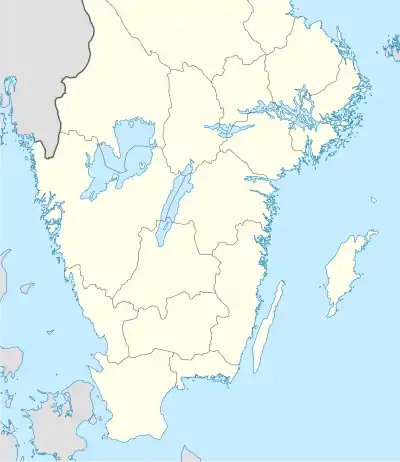Allsvenskan
Allsvenskan (Swedish pronunciation: [ˈâlːˌsvɛnːskan]; English: the All-Swedish, also known as Fotbollsallsvenskan, English: the Football All-Swedish) is a Swedish professional league for men's association football clubs. It was founded in 1924 and is the top tier of the Swedish football league system, operating on a system of promotion and relegation with Superettan. Seasons run from late March or early April to the beginning of November, with the 16 clubs all meeting each other twice, resulting in a 30-match season, for a total of 240 matches league-wide.
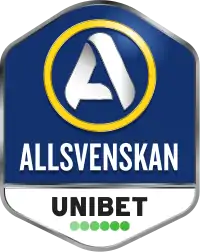 | |
| Founded | 13 January 1924 |
|---|---|
| Country | |
| Confederation | UEFA |
| Number of teams | 16 |
| Level on pyramid | 1 |
| Relegation to | Superettan |
| Domestic cup(s) | Svenska Cupen |
| International cup(s) | UEFA Champions League UEFA Europa Conference League |
| Current champions | Malmö FF (25th title) (2021) |
| Most championships | Malmö FF (25 titles) |
| Most appearances | Sven Andersson (431) |
| Top goalscorer | Sven Jonasson (254 goals) |
| TV partners | |
| Website | allsvenskan.se |
| Current: 2022 Allsvenskan | |
| Swedish football league structure |
|---|
| Allsvenskan (Tier 1) |
| Superettan (Tier 2) |
| Ettan (Tier 3) |
| Division 2 (Tier 4) |
| Division 3 (Tier 5) |
| Division 4 (Tier 6) |
| Division 5 (Tier 7) |
| Division 6 (Tier 8) |
| Division 7 (Tier 9) |
| Division 8 (Tier 10) |
Allsvenskan is ranked 23rd in the UEFA coefficients of leagues based on performances in European competitions over the last five years. Allsvenskan is currently ranked second highest of the leagues in Scandinavia after Denmark in 14th place. The current champions are Malmö FF, who won the title in the 2021 season.
"The Big Three" in Swedish football and Allsvenskan is used to refer to AIK, IFK Göteborg, and Malmö FF. They are generally considered to be the three largest clubs in Sweden from the three largest cities (Stockholm, Gothenburg, and Malmö). The three teams with most Swedish championships are Malmö FF (22), IFK Göteborg (18) and IFK Norrköping (13).
Including the 2021 season, Allsvenskan has been running for an unbroken streak of 96 seasons. Unlike other European football leagues, the Allsvenskan did not experience an interruption in play during World War II due to Swedish neutrality.
History
Allsvenskan started in the 1924–25 Allsvenskan season and the first winner was GAIS. The one-league twelve team Allsvenskan replaced the Svenska Serien, consisting of a southern and northern group that was held before. In 1931, the league started to decide the Swedish football champions.
In the early years, Norrland and Gotland teams were not allowed to play on higher levels in the league system, which was gradually changed to include the Norrland and Gotland teams on higher levels.
For the 1959 Allsvenskan, the season start was changed from autumn to spring to be played in one calendar year. In 1973, it was expanded to contain 14 teams. In the 1970s, Malmö FF, under the lead of Spanish Antonio Durán and later English Bob Houghton, won five Allsvenskan and managed to proceed to the 1979 European Cup Final, which they lost to Nottingham Forest.
From the 1982 season, the league introduced a play-off to determine the Swedish football champions. In the late 1980s, Malmö FF were dominant, winning the league five times in a row, but only two Swedish championships. The 1990 season saw the introduction of three points per win. The play-off season years were followed by two years of continuation league, named Mästerskapsserien.
The 1993 season saw a return to the classical format, again with 14 teams. IFK Göteborg won five Allsvenskan league titles in the 1990s.
In the early 2000s, Djurgårdens IF won three titles (2002, 2003 and 2005). In 2004, Örebro SK lost its place in the league due to financial problems, and Assyriska FF got their place. Since 2008, the league consists of 16 teams.
Status

The champions are considered Swedish champions and gold medal winners. The runners-up are awarded the Large Silver medal, the third positioned team are awarded the Small Silver medal and the team positioned in fourth place are awarded the Bronze medal.
There have been seasons with exceptions when the winners of Allsvenskan wasn't considered Swedish champions as well. Allsvenskan winners between 1924 and 1930 were crowned league champions and awarded gold medals, the title of Swedish champions was awarded to the winner of Svenska Mästerskapet up until 1925 and then not at all until 1930. The years 1982 through 1990 are also exceptions, the title was instead decided through play-offs during these years. The same was true for the years 1991 and 1992 when the title was decided through a continuation league called Mästerskapsserien. Historically, however, there is a big difference between the Allsvenskan winners before 1931 compared to the period between 1982 and 1992. As winning Allsvenskan in its earlier seasons was the optimal aim for the clubs, while as during the era of play-offs and Mästerskapsserien, the optimal goal wasn't to win Allsvenskan, but the play-offs or Mästerskapsserien.
Competition format
Since 2008 there are 16 clubs in Allsvenskan. During the course of a season (starting in late March and ending in early November) each club plays the others twice (home and away) for a total of 30 games. The two lowest placed teams at the end of the season are relegated to Superettan and the top two teams from Superettan are promoted in their place. The third lowest team in Allsvenskan plays a relegation/promotion play-off against the third placed team in Superettan.
The winners of Allsvenskan qualify for the UEFA Champions League, the runner-up together with the third placed team in the table qualify for the UEFA Europa League as well as the team who wins the Svenska Cupen. In case the winner of the Cup has already qualified to Champions League or Europa League, the third Europa League spot is given to the team that finishes fourth in Allsvenskan.
Changes in competition format
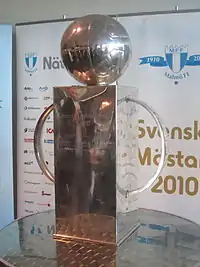
| From | To | Teams | Match-weeks | Season Start | Season End | Play-offs |
|---|---|---|---|---|---|---|
| 1924–25 | 1956–57 | 12 | 22 | Autumn | Spring | — |
| 1957–58 | 33 | Next autumn | — | |||
| 1959 | 1972 | 22 | Spring | Autumn | — | |
| 1973 | 1981 | 14 | 26 | — | ||
| 1982 | 1983 | 12 | 22 | Play-offs with eight teams | ||
| 1984 | 1990 | Play-offs with four teams | ||||
| 1991 | 1992 | 10 | 18 | Summer | League with six teams | |
| 1993 | 2007 | 14 | 26 | Autumn | — | |
| 2008 | Present | 16 | 30 | — | ||
The decider at equal number of points was goal ratio until the 1940–41 season, thereafter goal difference.
Awards
Trophy
The current trophy awarded to the Swedish champions is the Lennart Johanssons Pokal. Created in 2001, the trophy is named after former UEFA chairman, Lennart Johansson. A different trophy that was named after Clarence von Rosen, the first chairman of the Swedish Football Association, had previously been used between 1903 and 2000, but was replaced after journalists reported that von Rosen had personal connections to the later infamous Nazi leader Hermann Göring during the time he lived in Sweden (soon after World War One).[1] The former President of the Swedish Football Association, Lars-Åke Lagrell stated that the reason for the change of trophy was not a personal attack against Von Rosen but rather that the Football Association did not want to be linked to Nazism and constantly engage in discussions regarding this every time the trophy was awarded.[1]
Player and manager awards
In addition to the winner's trophy and the individual winner's medals awarded to players, Allsvenskan also awards the most valuable player, goalkeeper of the year, defender of the year, midfielder of the year, forward of the year, newcomer of the year and manager of year at Allsvenskans stora pris together with C More and Magasinet Offside.[2] Also, the Allsvenskan top scorer is awarded.
Television
Sweden
The Swiss corporation Kentaro has owned the TV rights for Allsvenskan since 2006.[3] Through licence agreements with the media company TV4 Group matches are aired through C More Entertainment who broadcasts them on their C More Sport and C More Live channels, until 2019. Matches can also be bought through the online pay-per-view service C SPORTS.[4]
On March 24, 2017, Discovery-owned channel Eurosport and OTT streaming service dPlay will be the new domestic broadcaster for both SEF competitions (Allsvenskan and Superettan) effectively from 2020 until 2025, as well as selected European countries (exc. Italy) for Allsvenskan.[5]
International
Beginning in 2018, Allsvenskan matches were previously broadcast in the UK on Premier Sports and FreeSports.[6] In October 2018, ESPN picked up the rights to broadcast one Allsvenskan match per week in the United States.[7] Allsvenskan matches have also been broadcast in several countries, such as DAZN in Austria, Germany, and Switzerland, Sport Klub in Balkan countries,[8] Nova sports in Cyprus and Greece, TV2 in Norway[9] and 4th Sports TV in Iraq[10]
Current broadcast rights
| Region | Broadcaster |
|---|---|
| Eurosport, Discovery+ | |
| Sport Klub | |
| Eurosport | |
| TVB | |
| NENT | |
| 4th Sports TV | |
| Sportitalia | |
| LiveScore | |
| ESPN+[7] |
Clubs
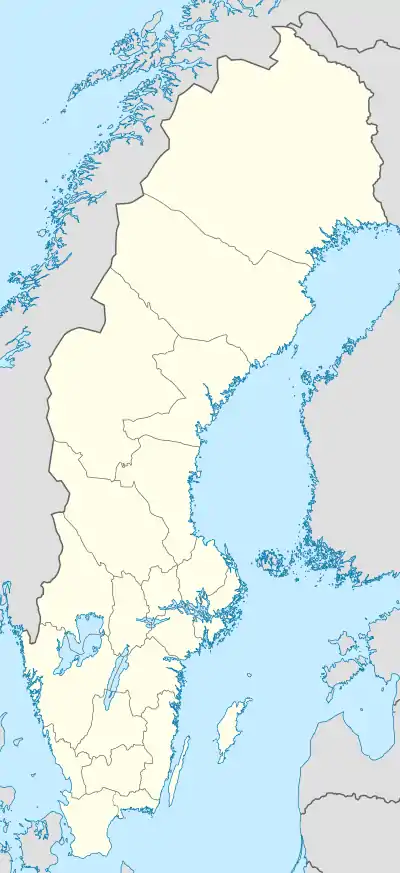
A total of 66 clubs have played in Allsvenskan from its inception in 1924 up to and including the 2020 season. No club have been a member of the league for every season since its inception. AIK is the club that has participated in the most seasons, with a record of 91 out of 96 seasons in total. Malmö FF has the record of most consecutive seasons, 63 consecutive seasons between 1936–37 and 1999. IFK Göteborg is currently the club with the longest running streak, starting their 46th season in 2022.
The following 16 clubs are competing in Allsvenskan during the 2022 season:
| Club |
Position in 2021 |
First season | Number of seasons | First season of current spell |
Titles | Last title |
|---|---|---|---|---|---|---|
| AIK | 2nd | 1924–25 | 92 | 2006 | 6 | 2018 |
| BK Häcken | 12th | 1983 | 20 | 2009 | 0 | — |
| Degerfors IF | 13th | 1940-41 | 6 | 2021 | 0 | — |
| Djurgårdens IF | 3rd | 1927–28 | 65 | 2001 | 7 | 2019 |
| Hammarby IF | 5th | 1924–25 | 52 | 2015 | 1 | 2001 |
| Helsingborgs IF | 3rd in Superettan | 1924–25 | 68 | 2022 | 7 | 2011 |
| IF Elfsborg | 4th | 1926–27 | 77 | 1997 | 6 | 2012 |
| IFK Göteborg | 8th | 1924–25 | 88 | 1977 | 13 | 2007 |
| IFK Norrköping | 7th | 1924–25 | 80 | 2011 | 13 | 2015 |
| IK Sirius | 11th | 1969 | 7 | 2017 | 0 | — |
| Kalmar FF | 6th | 1949–50 | 33 | 2004 | 1 | 2008 |
| Malmö FF | 1st | 1931–32 | 85 | 2001 | 25 | 2021 |
| Mjällby AIF | 9th | 1980 | 10 | 2020 | 0 | — |
| GIF Sundsvall | 2nd in Superettan | 1965 | 5 | 2022 | 0 | — |
| Varbergs BoIS | 10th | 2020 | 2 | 2020 | 0 | — |
| IFK Värnamo | 1st in Superettan | 2022 | 1 | 2022 | 0 | — |
Stadiums and locations
.jpg.webp)
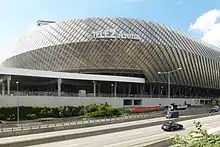
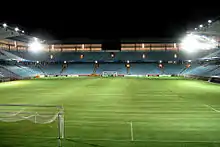
Current team and stadiums:
| Club | Location | Stadium | Capacity |
|---|---|---|---|
| AIK | Solna | Friends Arena | 54,000 |
| BK Häcken | Gothenburg | Bravida Arena | 6,500 |
| Degerfors IF | Degerfors | Stora Valla | 7,500 |
| Djurgårdens IF | Stockholm | Tele2 Arena | 33,000 |
| GIF Sundsvall | Sundsvall | NP3 Arena | 8,000 |
| Hammarby IF | Stockholm | Tele2 Arena | 33,000 |
| IF Elfsborg | Borås | Borås Arena | 16,899 |
| IFK Göteborg | Gothenburg | Gamla Ullevi | 18,900 |
| IFK Norrköping | Norrköping | PlatinumCars Arena | 15,734 |
| IK Sirius | Uppsala | Nya Studenternas | 10,000 |
| Kalmar FF | Kalmar | Guldfågeln Arena | 12,182 |
| Malmö FF | Malmö | Eleda Stadion | 22,500 |
| Mjällby AIF | Hällevik | Strandvallen | 6,750 |
| Varbergs BoIS | Varberg | Varberg Energi Arena | 4,500 |
| IFK Värnamo | Värnamo | Finnvedsvallen | 5,000 |
| Örebro SK | Örebro | Behrn Arena | 12,645 |
Managers
The current managers in Allsvenskan are:
| Name | Club | Appointed | |
|---|---|---|---|
| Bartosz Grzelak | AIK | 31 July 2020 | |
| Per-Mathias Høgmo | BK Häcken | 12 June 2021 | |
| Tobias Solberg Andreas Holmberg | Degerfors IF | 19 November 2019 | |
| Kim Bergstrand Thomas Lagerlöf | Djurgårdens IF | 16 November 2018 | |
| Henrik Åhnstrand | GIF Sundsvall | 12 December 2019 | |
| Martí Cifuentes | Hammarby IF | 12 January 2022 | |
| Jörgen Lennartsson | Helsingborgs IF | 23 December 2020 | |
| Jimmy Thelin | IF Elfsborg | 6 December 2017 | |
| Mikael Stahre | IFK Göteborg | 2 June 2021 | |
| Rikard Norling | IFK Norrköping | 23 December 2020 | |
| Kim Hellberg | IFK Värnamo | 6 December 2021 | |
| Daniel Bäckström | IK Sirius | 14 December 2020 | |
| Henrik Rydström | Kalmar FF | 29 December 2020 | |
| Miloš Milojević | Malmö FF | 7 January 2022 | |
| Andreas Brännström | Mjällby AIF | 29 December 2021 | |
| Joakim Persson | Varbergs BoIS | 28 November 2017 |
Players
| Rank | Player | Apps | Goals |
|---|---|---|---|
| 1 | 431 | 0 | |
| 2 | 416 | 0 | |
| 3 | 411 | 24 | |
| 4 | 410 | 254 | |
| 5 | 387 | 3 |
Appearances
Sven Andersson has the record for most appearances in Allsvenskan with 431 appearances for Örgryte IS and Helsingborgs IF. Sven Jonasson has the record for most matches in a row with 332 matches for IF Elfsborg between 11 September 1927 and 1 November 1942.
Foreign players
Until 1974, foreign players were banned from playing in Allsvenskan, however not on all levels of football in Sweden.[11] In the first season of allowance, on 13 April 1974, English Ronald Powell in Brynäs IF became the first foreign player in Allsvenskan[11] In 1977, Tunisian Melke Amri became the first non-European player. In 1978, Icelandic Teitur Þórðarson in Östers IF became the first foreign player to win the Allsvenskan[12]
| Rank | Player | Apps | Goals |
|---|---|---|---|
| 1 | 410 | 254 | |
| 2 | 260 | 194 | |
| 3 | 181 | 180 | |
| 4 | 176 | 179 | |
| 5 | 288 | 162 | |
| 267 | 162 |
Top scorers
Sven Jonasson has scored the most goals in Allsvenskan history, with 254 goals in 410 appearances. Gunnar Nordahl has become the top scorer most times, with four wins.
Previous winners
- Key
| Season when the league didn't decide the Swedish champions | |
| Season when Swedish champions wasn't awarded at all |
|
|
Performances
Medal table
Historically the players and coaching staff from the four best teams in Allsvenskan are awarded medals at the end of each season. The champions are awarded the gold medal while the runners-up receive the "big silver" medal. The third place team gets the "small silver" medal instead of the more commonly used bronze medal which is instead awarded to the fourth-place finisher. This tradition of awarding four medals and not three is thought to have to do with the fact that the losers of the Semi-finals of Svenska Mästerskapet were both given bronze medals since no bronze match was played.[13]
The overall medal rank is displayed below after points in descending order. 5 points are awarded for a "gold" medal, 3 points for a "big silver" medal, 2 points for a "small silver" medal and 1 point for a bronze medal. The table that follows is accurate as of the end of the 2020 season.[13][14][15]
| Rank | Club | Gold |
Big Silver |
Small Silver |
Bronze |
Points |
|---|---|---|---|---|---|---|
| 1 | Malmö FF | 25 | 15 | 10 | 8 | 198 |
| 2 | IFK Göteborg | 13 | 13 | 16 | 10 | 146 |
| 3 | IFK Norrköping | 13 | 10 | 5 | 8 | 113 |
| 4 | AIK | 6 | 15 | 12 | 8 | 107 |
| 5 | Helsingborgs IF | 7 | 8 | 8 | 10 | 85 |
| 6 | Djurgårdens IF | 8 | 3 | 11 | 4 | 75 |
| 7 | IF Elfsborg | 6 | 7 | 6 | 9 | 72 |
| 8 | GAIS | 4 | 4 | 4 | 4 | 44 |
| 9 | Östers IF | 4 | 3 | 3 | 3 | 38 |
| 10 | Örgryte IS | 2 | 2 | 6 | 6 | 34 |
| 11 | Halmstads BK | 4 | 2 | 2 | 2 | 32 |
| 12 | Hammarby IF | 1 | 2 | 3 | 3 | 20 |
| 13 | Kalmar FF | 1 | 2 | 2 | 3 | 18 |
| 14 | Åtvidabergs FF | 2 | 2 | - | 1 | 17 |
| 15 | Örebro SK | - | 2 | 2 | 4 | 14 |
| 16 | Degerfors IF | - | 2 | 2 | 2 | 12 |
| 17 | IK Sleipner | 1 | 1 | 1 | 1 | 11 |
| 18 | BK Häcken | - | 1 | 1 | 1 | 6 |
| 19 | Landskrona BoIS | - | - | 1 | 3 | 5 |
| Sandvikens IF | - | - | 1 | 3 | 5 | |
| 21 | IFK Malmö | - | 1 | - | - | 3 |
| Jönköpings Södra IF | - | 1 | - | - | 3 | |
| Råå IF | - | 1 | - | - | 3 | |
| 24 | Trelleborgs FF | - | - | 1 | 1 | 3 |
| 25 | IK Brage | - | - | - | 3 | 3 |
Honoured clubs
Clubs in European football are commonly honoured for winning multiple league titles and a representative golden star is sometimes placed above the club badge to indicate the club having won 10 league titles. In Sweden the star instead symbolizes 10 Swedish championship titles for the majority of the clubs as the league winner has not always been awarded the title of Swedish champions.[lower-alpha 1] Stars for Allsvenskan clubs was not common practise until 2006, although AIK had already introduced a star to their kit in 2000. IFK Göteborg, Malmö FF, IFK Norrköping, Örgryte IS and Djurgårdens IF were the first teams after AIK to introduce their stars. No new club has introduced a star since 2006, the clubs closest to their first are IF Elfsborg with 6 Swedish championship titles and Helsingborgs IF with 7 Allsvenskan titles depending on what the star symbolizes. The following table is ordered after number of stars followed by number of Swedish championship titles and then the number of Allsvenskan titles.
- Statistics updated as of the end of the 2021 season
| Club | Swedish championship titles | Allsvenskan titles | Stars | Introduced |
|---|---|---|---|---|
| Malmö FF | 22 | 25 | 2006 | |
| IFK Göteborg | 18 | 13 | 2006 | |
| IFK Norrköping | 13 | 13 | 2006 | |
| AIK | 12 | 6 | 2000 | |
| Djurgårdens IF | 12 | 8 | 2006 | |
| Örgryte IS | 12 | 2 | 2006 |
Cities
| Town or city | League wins | Clubs |
|---|---|---|
| Malmö | 25 |
Malmö FF (25) |
| Gothenburg | 19 |
IFK Göteborg (13), GAIS (4), Örgryte IS (2) |
| Stockholm | 15 |
Djurgårdens IF (8), AIK (6), Hammarby IF (1) |
| Norrköping | 14 |
IFK Norrköping (13), IK Sleipner (1) |
| Helsingborg | 7 |
Helsingborgs IF (7) |
| Borås | 6 |
IF Elfsborg (6) |
| Halmstad | 4 |
Halmstads BK (4) |
| Växjö | 4 |
Östers IF (4) |
| Åtvidaberg | 2 |
Åtvidabergs FF (2) |
| Kalmar | 1 |
Kalmar FF (1) |
All-time Allsvenskan table
The all-time Allsvenskan table, "maratontabellen" in Swedish, is a cumulative record of all match results, points, and goals of every team that has played in Allsvenskan since its inception in 1924–25. It uses three points for a win even though this system was not introduced until the 1990 season. The matches played in the championship play-offs between 1982 and 1990 or the matches played in Mästerskapsserien in 1991 and 1992 are not included. The table that follows is accurate as of the end of the 2021 season.[17]
Malmö FF are the current leaders, having had the lead since the end of the 2012 season when they overtook the lead from IFK Göteborg. IFK Göteborg are the club to have spent most seasons in the top spot with 48 seasons as leaders with a record of the most consecutive seasons as leaders with 35 seasons between 1938 and 1972. Six clubs have been in the lead, the lead having changed among them ten times since 1925. The former leader with the lowest current ranking in the table is GAIS, currently placing 12th and 2010 points short of Malmö FF.
A total of 66 clubs have played at least one season at Allsvenskan up to and including 2021 season.
|
|
Statistics
UEFA coefficients
The following data indicates Swedish coefficient rankings between European football leagues.[18]
UEFA League Ranking as of 19 May 2022:[19]
|
UEFA 5-year Club Ranking as of 19 May 2022:[20]
|
Attendance
| Year | Spectators per match |
|---|---|
| 2015 | 9,967 |
| 2016 | 9,127 |
| 2017 | 9,215 |
| 2018 | 8,423 |
| 2019 | 9,166 |
The record for highest average home attendance for a club was set by Hammarby in 2015 (25,507 over 15 home matches). Most other attendance records for Allsvenskan were set in the 1959 season, coinciding with the first season that the league switched from an autumn–spring format to a spring–autumn format. 1959 saw records for highest attendance at a match (52,194 at an Örgryte win over IFK Göteborg at Ullevi), second highest average home attendance for a club (25,490 for Örgryte's 11 home matches), and the highest ever average attendance for Allsvenskan as a whole (13,369).
In the past, AIK had the league's highest attendance for the season more often than any other club, followed by IFK Göteborg and Örgryte. However, for the past two decades, Hammarby has dominated the attendance figures helped by a move to the larger Tele2 Arena from the much smaller Söderstadion. Other teams that have for at least one season had the best attendance in the league include Helsingborg, Malmö FF, Djurgården, GAIS, Örebro SK and Öster.
Referees
.jpg.webp)
Allsvenskan has 23 active referees that are available for matches as of the 2020 season. Currently there are seven fully certified international FIFA referees in Allsvenskan. There are also a further twelve referees who are certified by the Swedish Football Association who have refereed matches in Allsvenskan. A further four referees certified by the Swedish Football Association are available to referee Allsvenskan matches but have not done so as of 2020.[21]
FIFA certified referees
- Mohammed Al-Hakim
- Andreas Ekberg
- Kristoffer Karlsson
- Glenn Nyberg
- Bojan Pandžić
- Martin Strömbergsson
- Kaspar Sjöberg
Allsvenskan in international competition
Malmö FF were runners up in the 1978–79 European Cup, after a 1–0 defeat against Nottingham Forest.[22] IFK Göteborg won the UEFA Cup twice, in 1981–82 (defeating Hamburger SV in the finals)[23] and 1986–87 (defeating Dundee United in the finals).[24] IFK Göteborg also reached the semi-finals of the European Cup in 1985–86. They won 3–0 against FC Barcelona, and lost 0–3 at Camp Nou, Barcelona won on penalty shootout.[25]
The following teams have participated in UEFA Champions League, UEFA Europa League or UEFA Europa Conference League group stages:
| Club | UEFA Champions League | UEFA Europa League | UEFA Conference League |
|---|---|---|---|
| IFK Göteborg | 1992–93 1994–95 1996–97 1997–98 |
— | |
| Malmö FF | 2014–15 2015–16 2021–22 |
2011–12 2018–19 2019–20 2022–23 | |
| Helsingborgs IF | 2000–01 | 2007–08 2012–13 | |
| AIK | 1999–2000 | 2012–13 | |
| IF Elfsborg | — | 2007–08 2013–14 | |
| Halmstads BK | — | 2005–06 | |
| Östersunds FK | — | 2017–18 | |
| Djurgårdens IF Fotboll | — | — | 2022–23 |
See also
- Damallsvenskan
- List of Allsvenskan top scorers
- List of foreign Allsvenskan players
- Seasons in Swedish football
- Sports attendances
Footnotes
- The title of "Swedish Champions" has been awarded to the winner of four different competitions over the years. Between 1896 and 1925 the title was awarded to the winner of Svenska Mästerskapet, a stand-alone cup tournament. No club were given the title between 1926 and 1930 even though the first-tier league Allsvenskan was played. In 1931 the title was reinstated and awarded to the winner of Allsvenskan. Between 1982 and 1990 a play-off in cup format was held at the end of the league season to decide the champions. After the play-off format in 1991 and 1992 the title was decided by the winner of Mästerskapsserien, an additional league after the end of Allsvenskan. Since the 1993 season the title has once again been awarded to the winner of Allsvenskan.[16]
- Hammarby IF were deducted three points in 2006.
- Ljungskile SK were known as Panos Ljungskile SK during the season of 1997.
References
- Thorén, Petra. "SM-pokalen ska skrotas". aftonbladet.se (in Swedish). Retrieved 2011-01-03.
- "Allsvenskans stora pris 2013". Archived from the original on October 6, 2014. Retrieved October 1, 2014.
- "Tar kameran – med våld" (in Swedish). 2008-04-26. Retrieved 2008-05-06.
- "Nytt tv-avtal för allsvenskan". svenskfotboll.se (in Swedish). The Swedish Football Association. 22 March 2013. Retrieved 22 March 2013.
- "Swedish Allsvenskan on Eurosport from 2020". SEF (in Swedish). 2017-03-24. Retrieved 2020-02-09.
- "Eleven adds CSL, Eredivisie and Allsvenskan rights to new UK service - SportsPro Media". www.sportspromedia.com. Retrieved Apr 2, 2019.
- "ESPN+ and ESPN Acquire Rights to Coppa Italia and Supercoppa Italiana". Oct 2, 2018. Retrieved Apr 2, 2019.
- "Live TV Guide". sport-tv-guide.live. Retrieved 2018-10-17.
- "TV 2 Sumo". sumo.tv2.no (in Norwegian). Retrieved 2018-10-17.
- "Allsvenskan confirms deal with PRO Company with mission to expand audiences in Middle-East,". svenskelitfotboll.se. Retrieved 2021-10-20.
- "Importsvenskan". Aftonbladet.
- "Allsvenskan i Fotboll 1978". Fotbollsweden.se. Retrieved 2016-03-19.
- "Guld, stort silver, litet silver och brons?". svenskfotboll.se. The Swedish Football Association. Archived from the original on 2011-09-28. Retrieved 22 September 2011.
- "Helsingborgs IF – ALLSVENSKAN 1937/38". hif.se. Archived from the original on 2015-02-27. Retrieved 2014-03-10.
- "AIK Statistikdatabas (Herrar)". aik.se.
- "Svenska mästare 1896–1925, 1931–" [Swedish champions 1896–1925, 1931–]. svenskfotboll.se (in Swedish). The Swedish Football Association. Archived from the original on 2 December 2009. Retrieved 22 August 2012.
- Lindahl, Jimmy. "Allsvenska maratontabellen 1924/25-2021". Swedish Football Association. Retrieved 2019-11-10.
- "UEFA Country Ranking 2021". Bert Kassies. Retrieved 6 September 2021.
- "UEFA Country Ranking 2022". Retrieved 19 May 2022.
- "Club coefficients". Retrieved May 19, 2022.
- "Elitdomare i herrfotboll". svenskfotboll.se. Retrieved 23 February 2013.
- "UEFA Champions League 1978/79 - History - All matches". UEFA.com.
- "UEFA Europa League 1981/82 - History - All matches". UEFA.com.
- "UEFA Europa League 1986/87 - History - All matches". UEFA.com.
- "UEFA Champions League 1985/86 - History - All matches". UEFA.com.
